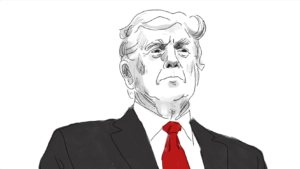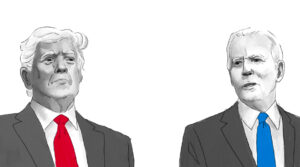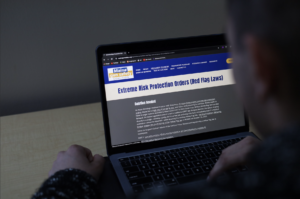On Tuesday Sept. 29 President Donald Trump and former Vice President and Democratic Presidential Nominee Joe Biden had their first presidential debate of the 2020 election cycle. Although the debate was unconventional, to say the least, the candidates did discuss some of their policy positions. Here’s what audience members were able to find out.
The discussion, moderated by Chris Wallace of Fox News, tackled the issue of COVID-19. Unfortunately, the two candidates did not address many specific policy stances regarding COVID-19. However, there was clearly plenty of animosity between the two candidates’ positions on how to handle the crisis.
According to the debate, Trump stated that “[the military] is all set up” for implementing a vaccine, whenever it is ready. Biden disagreed that there would be a vaccine coming soon. He commented that he believed that the earliest we could see a vaccine is next year.
The debate also provided clarity on Trump’s opinion of masks. When pushed, Trump stated, “I think masks are okay,” and “I wear masks when needed.” Biden took a firmer stance on masks and said that everyone should “wear masks between now and January.”
Although it was a point of contention, both candidates agreed that there is value in opening the economy. Trump stated, “I want to keep it [the economy] open,” while Biden advocated for more assistance for small businesses, and said, “The way to open businesses is to give them the wherewithal to be able to open.” Neither candidate showed enthusiastic support for drawing out a government shutdown.
In light of the recent passing of Supreme Court Justice Ruth Bader Ginsburg, the candidates were both questioned about the opening on the Supreme Court. The two candidates have clearly opposing views on who has the right to appoint the next Supreme Court justice. During the Supreme Court section of the debate, Trump stated that he felt as though he has the right to appoint a justice before the election on Nov. 3.
“We [the Trump administration] won the election and therefore we have the right to choose [the next justice],” Trump said.
His argument revolved around the idea that the Constitution gives the power of appointing justices to the president, and he is still the president until at least January.
“So we won the election and we have the right to do this […] I’m not elected for three years,” Trump continued. Trump also felt as though he has the power to nominate after the election claiming, “I have a lot of time after the election, as you know.”
Biden on the other hand agreed with the precedent set under the Obama Administration; that it would be too close to an election to choose the next Supreme Court justice.
“We’re in the middle of an election already […] we should wait and see what the outcome of this election is,” Biden said.
Throughout the segment, Biden strongly felt that the American people should choose the person they want to nominate the next Supreme Court Justice. He continued, “the American people should speak.” Biden maintained his belief that the president elected on Nov. 3 and sworn into office in January should nominate the next justice.
It is now widely known that Amy Coney Barrett is Trump’s nomination for the Supreme Court of the United states. When asked for his opinion, Biden described her as a “very fine person.”
Court packing, the last hot-button Supreme Court issue taken up on Tuesday night, was addressed in a question directed to Biden, who refused to comment.
Wallace next questioned the candidates on health care. Trump and Biden expressed contending stances on health care, and their debate was focused on the Affordable Care Act (ACA), commonly known as Obamacare. Trump divulged that he would like to repeal Obamacare completely and reminded viewers that he already eliminated the individual mandate which he described as the “worst part of Obamacare.” In the face of being accused of making health care less affordable for Americans, Trump claimed that drug prices would be “coming down 80 or 90%.” When asked about protecting Americans with preexisting conditions, Trump stated, “We guaranteed pre-existing conditions.” This claim refers to a recent executive order which Trump signed on Sept. 24 titled “Executive Order on An America-First Healthcare Plan.” Trump expressed that his main problem with healthcare today is that it is “too expensive and the premiums are too high.” Biden agreed that healthcare needs to be more affordable for Americans.
In contrast to Trump’s intent to repeal the ACA, Biden expressed his support for adding a public option to Obamacare. Although under pressure during the debate, he was clear that not all Americans would be enrolled in the public option. Only Americans who already qualify for Medicaid would be automatically enrolled in the public option, and Biden argued it would not end private insurance. Biden clarified that the “vast majority” of Americans would remain in the private domain of health care.
The changing climate of our planet is an important issue to many voters; Wallace asked the two candidates a few questions regarding the climate and the environment. The two candidates disagree on the Paris Climate Agreement. Trump, who pulled America out of the agreement, called it a “disaster.” Biden stated that he agreed with rejoining the agreement if he were elected. Both candidates showed support for cleaner air and water. Trump stated, “I want crystal clean water and air.” However, Trump is concerned with not interfering with business practices, and commented that he felt it is important that “Our businesses aren’t put out of commission.” Biden described that he supports a move to renewable energy sources and running the federal fleet on renewable energy.
When questioned, Trump admitted that humans have contributed to climate change “to an extent.” When pushed by inquiry from Trump, Biden stated “I do not support the Green New Deal.” Instead, Biden proposed an alternate climate action agreement, which he called the “Biden Plan.”
No matter where you stand politically, it is important to know your rights as a voter. In Maine, voters can practice same day registration if they plan to vote in person on election day. If you plan to register to vote by mail, you must do so 21 days before the election. Absentee ballots in Maine are available upon request until Thursday Oct. 29 at 5 p.m. You can find more information about voting and voter registration at https://www.maine.gov/sos/cec/elec/voter-info/voterguide.html .











